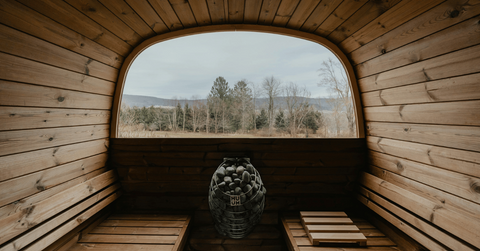Guide to Choosing a Wood Heater for Your Sauna

Aug. 1 2024, Published 3:00 a.m. ET
Humans have been enjoying the wellness and relaxation benefits of sweating it out in a sauna since the earliest civilizations 7,000 years ago. While taking a sauna is traditionally associated with Scandinavia, saunas have become increasingly popular in the US over the past decade. A home sauna is the new must-have for affluent American families, but enjoying the most authentic experience is dependent on choosing the right wood heater.
True, gas or electric heaters are available, and the latter, in particular, are incredibly convenient, delivering precision heat in minutes. They are also a better option in areas subject to strict EPA clean air rules. But for many, the sound and smell of wood burning in the heater all contributes to the relaxation, and the whole sauna experience is lacking without it.
A wood burner also brings its own type of convenience. A gas or electric sauna heater, needs to be installed by a professional qualified engineer, and in the case of electric, you will also need to have a mains electricity supply somewhere nearby. But a wood heater can be installed by anyone with moderate DIY skills and a standard toolkit. Furthermore, it can be used in an outdoor sauna anywhere, even in an off-grid location miles from the nearest mains electricity supply.
Size Matters When It Comes to Sauna Wood Stoves
You might be surprised to see just how many sauna stoves there are for sale on the US market, and anyone who is new to saunas could feel a little overwhelmed. Work out what size you need first, and you can immediately narrow the choice down to a more manageable level.
The size you need will be dictated by the computational internal volume of your sauna. Most of the popular brands like Harvia have wood saunas numbered 18, 18, 22 and so on. This corresponds with the width of the sauna heater in inches.
When you look at different wood burning sauna heaters, you will see the heater size to sauna size guidelines written in the product specification table for each product. This is typically as follows, although it can vary slightly from one model to the next, so double check the specifications before making a final choice:
16” – 300 to 550 cubic feet
20” – 400 to 700 cubic feet
24” – 500 to 850 cubic feet
Keep in mind that the computational volume is higher than the physical volume, as it takes heat loss into account. The exact calculation depends on the level of insulation and whether there is a lot of glass in the design. But a common rule of thumb is to add 25 percent.
So for example a six by eight sauna that is eight feet high has a physical volume of 384 cubic feet. Adding 25 percent comes to 480, so this sauna is therefore likely to need a 20” wood burning sauna heater.
Does Your Wood Burning Sauna Heater Need Heat Shielding?
Some wood burning sauna heaters need additional heat shielding. Heat shielding is necessary when the minimum safety distance specified between the wood burning sauna and combustible material cannot be met.
For example, shielding will be needed if there are wooden benches or panels closer to the heater than the minimum safety distances, or if the heater is positioned on a wooden floor, a heat shielding base will be needed.
Manufacturers like Harvia and Saunacore make free standing heat shields and insulated bases that are designed to work alongside their wood fired sauna heaters. These typically have two layers of steel. Being free standing as opposed to wall mounted means the user can periodically inspect the areas around the heater to double check that there is no scorching.
In larger outdoor saunas, it is possible to negate the requirement for heat shielding by using non-combustible on the walls and floor around the heater. The most common choice is to use breeze blocks, and then clad them with stone or porcelain tiles. Tiling directly onto a wooden surface is not advised, as it can present a fire risk if the wood starts to scorch behind the tiles.
Choosing Stones for Your Sauna Heater
The sauna experience is all about the stones, and in Finland there is a saying that the more stones the sauna heater has, the more enjoyable the löyly or steam. In most cases, stones are sold separately from wood fueled sauna heaters, and they are considered a consumable. Just how often you need to replace them depends how often you use your sauna, but most people do so at least annually.
The sauna heater will provide a minimum requirement for stones. Again, this depends on the size and model, but a typical 16” heater has a capacity of 80 to 90 lb of stones, while a 26” heater will need about 150 lb.
Stones typically come in 45 lb bags, which will cost around $90. Even for a larger heater, that is not too expensive for a once-per-year expenditure, so do not compromise. When they are past their best, stones will start to crumble and can ultimately damage the sauna heater, so using worn out stones is a false economy.

Wood Burning Sauna Heaters With Water Tanks
Some wood burning sauna heaters have extra water tanks. These can also be purchased separately and plumbed into the heater. These mean the sauna heater can also be used to heat large amounts of water.
Typically, this is so the user can also run a shower or bath using the same heat source. Whether this is necessary depends on the type of use and the location of the outdoor sauna. If it is is your back garden in American suburbia, it is probably not necessary, as you can simply go for a bath or shower in the house.
However, sauna heaters with in-built water heaters can be extremely useful in an off-grid setting, such as a cabin deep in the woods where there is no running water or mains electricity. Heating hot water is not an option with every wood burning sauna heater, so this is another factor to keep in mind if this type of functionality will be useful to you.


